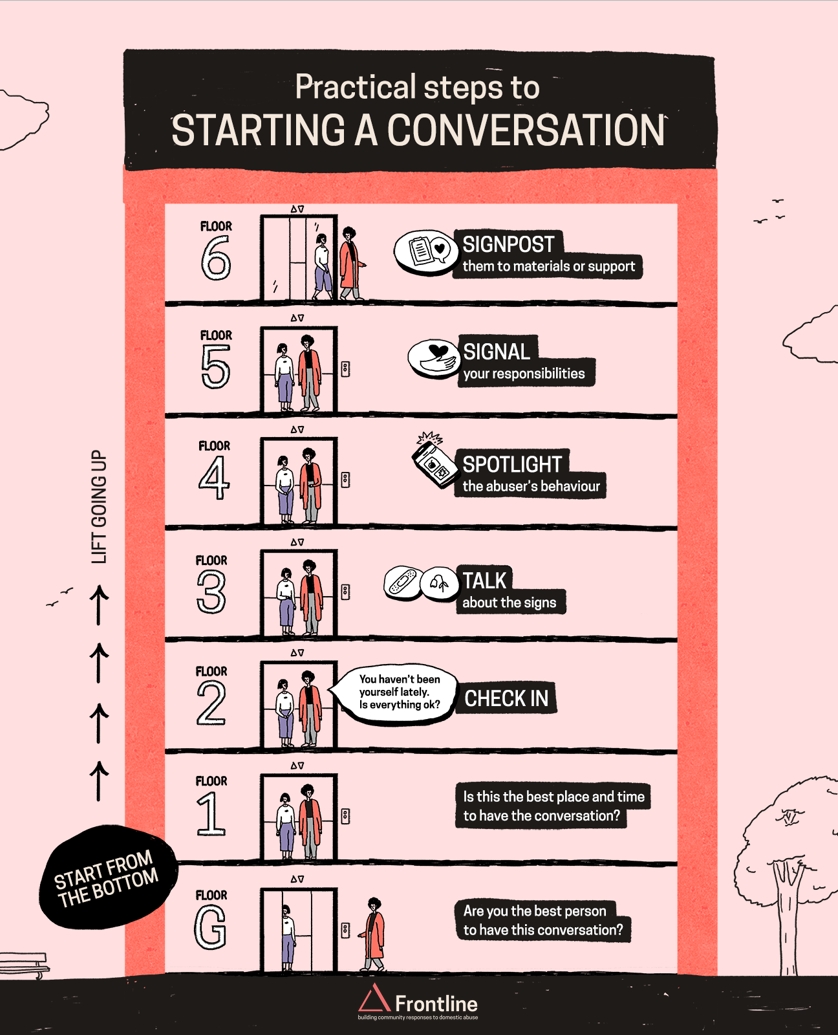Starting the conversation
Here's a checklist to help you approach the person you want to support in a helpful and compassionate manner.
Frontline's conversation guide
I am the best person to have this conversation with if ...
If neither of these things apply, consider:
asking HR to mediate.
establishing a basis of trust with the person.
What about the manager?
In our interviews with survivors of domestic abuse, most preferred to be approached by someone they trust or alternatively, HR or a fellow co-worker. A manager was listed as the least favorable option due to fears about employment.
It's the best time and place to have this conversation if ...
If not all of these things apply, consider:
changing the venue if the time is good.
scheduling a new time and place.
Can I approach the person at work?
The best place is never the workplace for many reasons. The person could be distracted, not be able to relax or open up and in the worst case, start associating the workplace with anxiety about the abuse being exposed. Therefore, if possible: we suggest a cafe/park bench/restaurant/etc. in walking distance to the workplace.
When checking in, ...
DO ask open questions centered on the person's welfare
"How are you, really?"
DON'T say things that could suggest blame or expectations
"Why do you not leave?"
DO affirm their courage
"Thank you for telling me this."
DON'T assume
"They probably experience domestic abuse because they're poor/migrants/like it/stupid/deserving of it/etc."
DO listen
DON'T dismiss their experiences
"You're reading too much into this."
What if it goes badly?
The person might not be ready to talk about it, not aware of the abuse or simply, not experiencing domestic abuse. Whatever the reason, we recommend following the guide to the end anyway. It's better to be wrong than to find out later you were right. Remember that your concerns come from a place of care.
What signs of abuse have you noticed?
How has the abuse affected the person? Have you experienced a change in their behaviour or cognitive capacities? Do they appear more distant and less cheerful?
We are least likely to realise changes in our own behaviour. As a supporter, you can help them see the signs of abuse, i.e. how the abuse has changed them.
An example could be:
"I've noticed that you seem really depressed lately. You don't enjoy work or other things as much anymore."
"You've come to work with bruises that look really bad. You also have a hard time staying awake at work. Are you getting enough sleep?"
Why spotlight the abusers' behaviour?
Perpetrators of domestic abuse are experts at altering the perception of their victims to the extent that victims themselves may not recognise the abuse however severe and obvious it may be to outsiders.
Victims might have been gaslit into thinking that the abuse is justified, normal and necessary.
Show the victim that you see them and the abuse. It is important you share an alternative view. However, when you do so, please refrain from suggesting blame or accusations at the perpetrator as the person might still be in love with them.
Here are some examples:
“Your partner has been spamming you with messages throughout the week. You don’t look happy when you receive them.”
“Whenever we go for work drinks, he makes fun of you in front of your colleagues. What he's saying sometimes goes too far.”
Remember...
It's important to keep to the facts. Do not needlessly belittle or attack the abuser. Why? Often, the person you are trying to help cares deeply for their abuser. Attacking the perpetrator might only serve to alienate you.
What responsibilities?
It's important that you and the [potential] victim know what you can and can't do.
What you can do will depend on your spheres of influence, i.e. your proximity to the affected person and your power to support. As a HR staff member or manager, you might have the power to implement institutional support services. As a co-worker, your support might focus more on workload, i.e. taking over work meetings, or involve supporting your colleague (at their request) in approaching a senior member of staff.
Make sure to clarify to the victim that confidentiality will be kept to the degree necessary to protect themselves, the workplace and others.
Record everything the victim shared with you as well as your observations in a mail to that person. The times and types of abuse you’ve noted down might make it easier for the person to build a legal case against the perpetrator later.
Why signpost?
Firstly, whilst you are important to ending the cycle of violence, you are not a counselling service. Signposting to professional services relieves you of the burden and let's professional services take over.
So, instead of offering generic support, explicitly name what yours and other organisations could do to help. The victim might not be aware of such options.
If you want, you can also offer practical support in accessing these services. This could involve taking a meeting in their place so they can go visit a specialist, or accompanying them as mental support to these appointments.
What materials / support?
Before you approach the person, you should inquire about internal support possibilities at HR for victims of domestic abuse. Please have a look at our list of external support services near you. However, entering support service [your region] in a search engine should also produce some results.
Contact lena@frontline100.com if you would like a consultation on the support you could be offering staff.
What if I need to call the police?
The police should be called immediately if there is an acute danger to the person you are supporting and/or other people. What you can expect thereafter to happen is explained more thoroughly HERE.
Test your knowledge
Last updated
